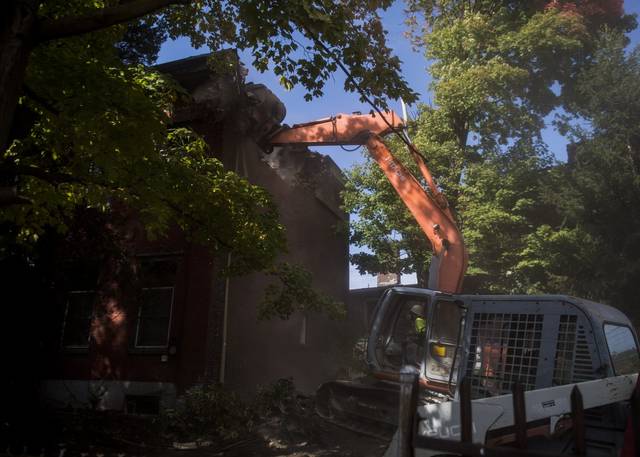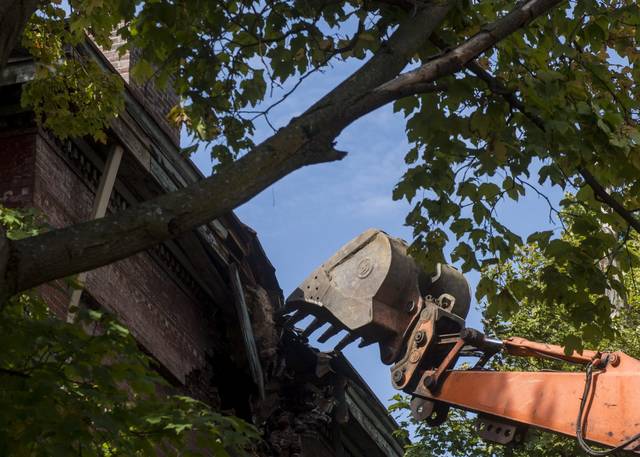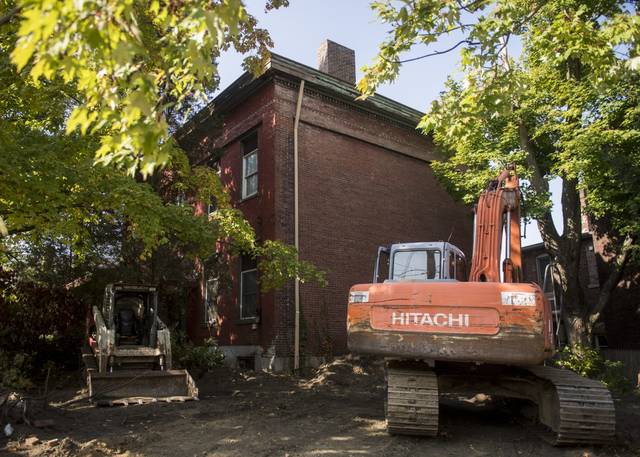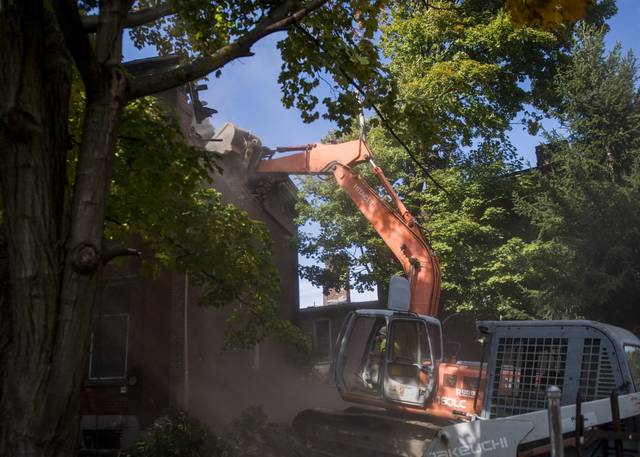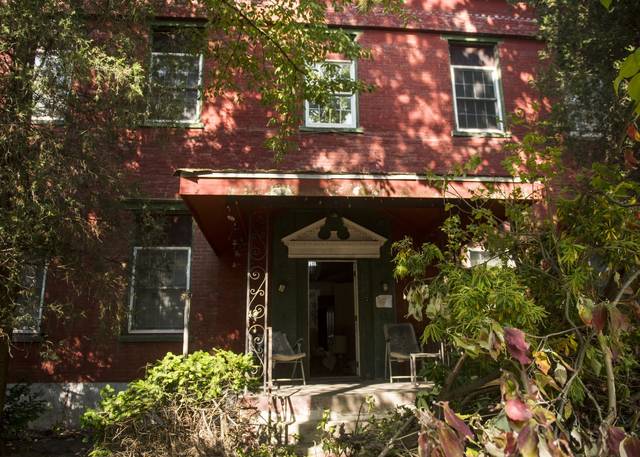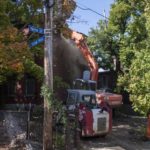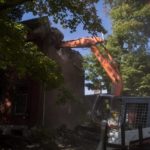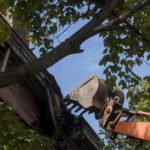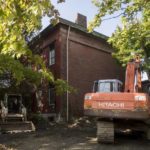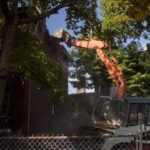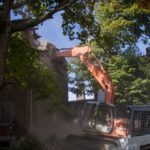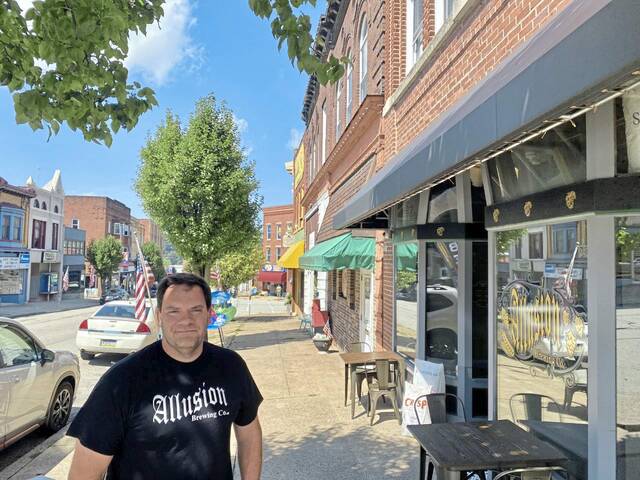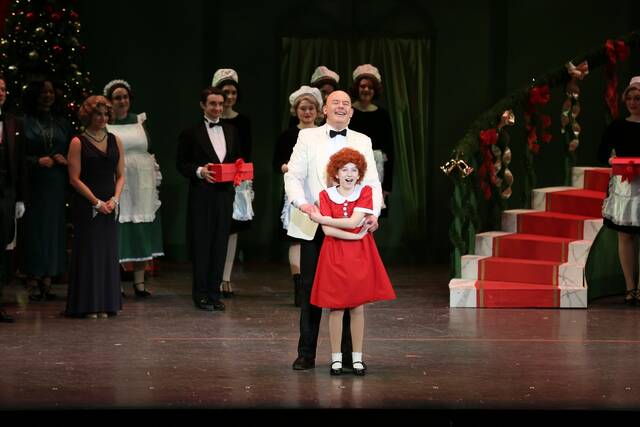After several months of back-and-forth, the long-disputed fate of Lawrenceville’s Ewalt House has been decided. Demolition began Wednesday.
Beth Rupert, one of the home’s owners, said demolition was a relief — with the building in disrepair, she said she feared the liability and safety of leaving the house standing.
“It’s bittersweet for us,” she said.
Many community members in Lawrenceville were sad to see the 186-year-old house come down. The Greek Revival-style building was built for Samuel Ewalt, a sheriff, assemblyman and landowner in the area. It was one of few pre-Civil War area houses left in the city, and one of the last of its kind in fast-developing Lawrenceville. Some see the loss of the house as a loss of character in the neighborhood.
“I feel so rattled right now,” said Reagan West-Whitman, a Lawrenceville resident who passed by the house while she was out grocery shopping. She said she didn’t know the demolition was happening Wednesday, and it took her by surprise.
Demolition like this, she said, is “flat-out destroying Lawrenceville.”
The disagreement leading up to Wednesday was long and nuanced. The Ruperts had intended to demolish the house and sell the property to a development firm, Duncan Ventures, last year. Beth Rupert said the house, which sat vacant, was too expensive for the Hampton-based family to maintain. She described myriad damages and disrepairs.
Their plans were put on hold when Lawrenceville Stakeholders, a community advocacy group, nominated the house for a historical designation and contested the variances approved to Duncan Ventures, which planned to build five townhouses on the land. Lawrenceville architects Bill and Jill Joyce testified in court that the house could still be saved — they said rehabilitation and repairs were feasible, according to court documents.
Pittsburgh’s Historical Commission and Planning Commission both recommended the home’s historical designation. But the vote was delayed by City Council and the bill was later withdrawn altogether.
City Councilwoman Deb Gross, who represents Lawrenceville, said it was “discouraging and disappointing” the council didn’t achieve the historical designation.
“It’s really heartbreaking to see such a significant part of the neighborhood history just be turned into garbage like this,” Gross said. “We should have been able to save it.”
Community advocacy groups Lawrenceville United and the Lawrenceville Corporation said in a joint statement that the demolition is an “unfortunate example” of development pressures and extraction of wealth in the neighborhood.
“As one of the oldest standing homes in the community and a contributing property to Lawrenceville’s designation on the National Registry of Historic Places, the home carried a lot of our neighborhood’s history, including the legacy of racism and slavery, and the ongoing connection to the forces of gentrification, displacement, and erasure we see today,” the statement reads. “We can imagine a different outcome for this property where those legacies could be meaningfully grappled with and actually repaired.”
“We hope the owners, who repeatedly invoked the Black Lives Matter movement in their arguments against the preservation of the home, address how this outcome and their profits will benefit the descendants of the human beings Samuel Ewalt owned as slaves, or Black residents impacted by centuries of racism,” the statement said.
During the debate over the house, Beth Rupert cited Ewalt’s history as a slaveholder, pointing to his appearance on a University of Pittsburgh database of slaveholders in the region. “We should not have that house stay up to glorify a corrupt slave owner,” she has said.
Rupert said her family has been criticized throughout the legal proceedings of the past few months. She maintains they have personal connections to the home and would have preserved it if they were financially able. She said her efforts to work with community advocates to find a solution or find a buyer with fair market price were unsuccessful.
“There has to be a balance of homeowners and the community coming together,” she said. “It wouldn’t have ended the way it did.”
Rupert describes the issue as a family matter.
“There’s no empathy,” she said. “We did the best we could in what we did for our family.”
Gross said community members have strong neighborhood and family connections to the site, too. It was once home to the architect Charles Bickel and was once used as a social hall to a Polish-American organization. Now, standing in front of the demolition site, she said it’s a “half-gone pile of pieces.”
“It’s hard to relay that to people whose neighborhoods aren’t under such intense change,” Gross said. “In Lawrenceville, most people have really had enough. It’s really hard to lose this much so quickly.”



